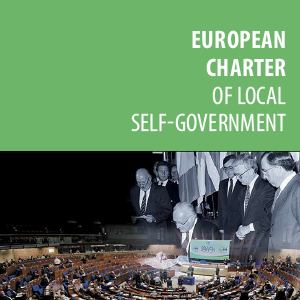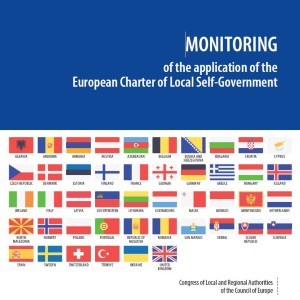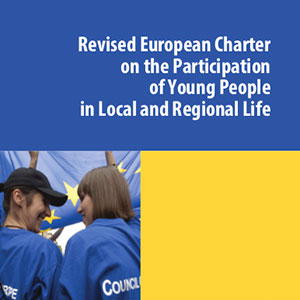The European Charter of Local Self-Government
The European Charter of Local Self-Government (ECLSG) lays down standards for protecting the rights of local authorities and requires states which have ratified it to comply with a number of conditions, principles and practices. States undertake to respect a core of basic principles to which no reservation is possible – such as the right of citizens to participate in managing public affairs, the key rights of communities to enjoy autonomy and self-government, elect their local bodies and to have their own structures and financial resources.
States undertake to respect a core of basic principles to which no reservation is possible – such as the right of citizens to participate in managing public affairs, the key rights of communities to enjoy autonomy and self-government, elect their local bodies and to have their own competences, administrative structures and financial resources, or the right of recourse to a court in case of interference from other levels. Through these core principles, the Charter seeks to ensure the compatibility of the diverse structures of local communities in the Council of Europe member states. However, the final aim remains the respect of all of the Charter’s provisions.
Cities and regions vanguard of democracy
The recognition of local democracy by the Council of Europe member states led in 1985 to the adoption of the European Charter of Local Self- Government. This text affirms the role of communities as the first level for the exercise of democracy. It has become the benchmark international treaty in this area.
Rights of communities enshrined in law
The Charter requires that the principle of local self-government be embedded in domestic law and if possible in the Constitution in order to guarantee its effective implementation. It also lays down the principles of democratic functioning of communities.
Guaranteeing the independence of elected representatives
The conditions of office of local elected representatives must ensure that they are able to exercise their functions freely within the limits of local self-government. They must be able to determine their own administrative structures and recruit competent staff.
Resources to match the tasks of communities
The Charter is the first treaty to lay down the principle of the transfer of competences to local communities, which must be accompanied by a transfer of financial resources. This principle, known as the principle of subsidiarity, allows for the decentralisation of power towards the level closest to the citizen.
The Charter, a framework to protect local communities
The Charter establishes a number of safeguards to protect the rights of local communities. For instance, the boundaries cannot be changed without agreement of the community and the supervision of the activities of local authorities must be defined by law, with the possibility of recourse to a court.
The Congress, watchdog of the rights set out in the Charter
The Congress makes sure that these principles are observed through systematic monitoring and regular dialogue with the governments of the Council of Europe member states. This dialogue is crucial to assess the impact and the implementation of the European Charter of Local Self-Government.

Booklet
The European Charter of Local Self-Government
Official languages:
Working languages:
Other languages:

Leaflet

Booklet

Brochure

Booklet
A6 - 65 pages - Pdf
Revised European Charter on the Participation of Young People in Local and Regional Life
Official languages:
Working languages:
Other languages:
Other translations:
(text only)
Opened for signature on 15 October 1985 and entered into force on 1 September 1988, the Charter is ratified by all 46 Council of Europe member states.
Reports by country
Other reports
An Additional Protocol on the right to participate at public life was adopted in 2009 to supplement the text of the European Charter of Local Self-Government. Its purpose is to bring within the scope of the Charter the right of any person to participate in the affairs of a local authority, a principle enshrined in the Preamble to the Charter.
Additional Protocol on the right to participate in the affairs of a local authority
Full text of the European Charter of Local Self-Government available on the website of the Council of Europe Treaty Office :
Non official translations:
Albanian – Armenian – Azerbaijani – Bosnian – Bulgarian – Croatian – Czech – Dutch – Estonian – Finnish – Georgian – German – Greek – Hungarian – Italian – Latvian – Lithuanian – Moldovan – Norwegian – Polish – Romanian – Russian – Slovak – Slovenian – Spanish – Swedish – Turkish – Ukrainian
The Committee on the Honouring of Obligations and Commitments by member states of the European Charter of Local Self-Government (Monitoring Committee) is responsible for assessing the application of the Charter.

Committee Secretary
Tel. + 33 3 90 21 51 84



